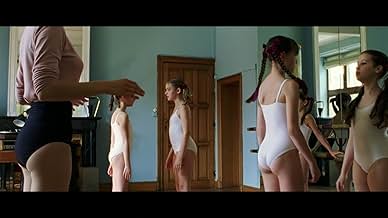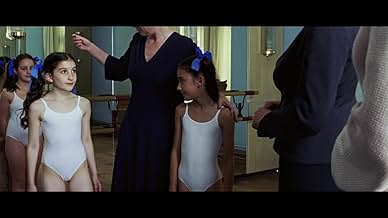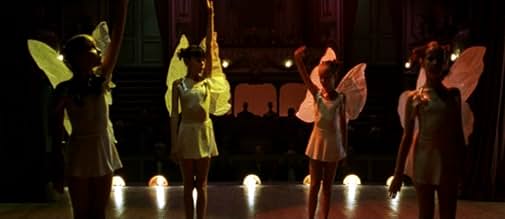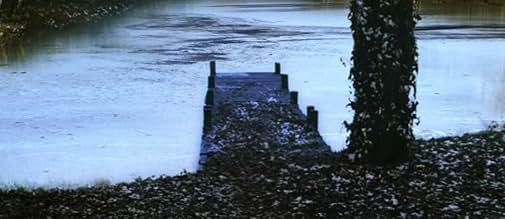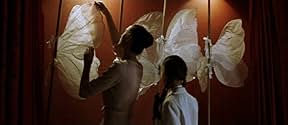IMDb RATING
6.8/10
6.8K
YOUR RATING
A look inside an offbeat boarding school for young girls.A look inside an offbeat boarding school for young girls.A look inside an offbeat boarding school for young girls.
- Director
- Writers
- Stars
- Awards
- 8 wins & 2 nominations total
- Director
- Writers
- All cast & crew
- Production, box office & more at IMDbPro
Featured reviews
The final title, "for Gaspar" (Noe, director of IRREVERSIBLE), hints at the pedigree of the makers of this quite fascinating study of young girls on the cusp of adolescence.
Benoit Debie, the cinematographer of IRREVERSIBLE, shot the film.
Six year old Iris (Zoe Auclair) arrives at her new country school in a coffin. She becomes infatuated with twelve-year-old Bianca (Berangare Haubruge) who disappears each evening and returns in the morning. The girls spend most of their days studying ballet and preparing for an important exam.
The school is like a keep. The girls are encouraged to find happiness in obedience. Parents never visit. The world beyond its tall hedges exists like something within a dream.
Director Lucile Hadzihalilovic imbues every aspect of the film with a dreamy, meditative veneer. Shots of the pre-teen nymphs dancing, cartwheeling and splashing about in shallow water recall the grainy erotic imagery of David Hamilton's early feature films -- in particular, LAURA and BILITIS. The ballet sequences and striking compositions of solitary female figures in towering external landscapes owe a small debt to Dario Argento's SUSPIRIA and, to a lesser extent, his PHENOMENA. But this is not a deliberate softcore meditation on childhood sexuality. It is a metaphorical examination of how innocence is ruptured by its own curiosity.
The camera angles stress the importance and prominence of legs to a fetishistic degree. This focus is an organic extension of the girls' ballet training; a darker purpose for legs is indicated later in a chilling line of dialogue. Debie's cinematography emphasizes light and shade and is never pretty for its own sake.
The forest filled with lamps has a deliciously surreal, fairytale quality. The sequences where the girls dance for a faceless audience reminded me of one of MULHOLLAND DRIVE's most haunting sequences. The film's sound design also echoes the internal voids of the Lynchian world.
The film is not big on explanations and is a touch too slow at times, but it presents a thoroughly realized universe that is a stark metaphor for life's discoveries and disappointments. The performances possess perfect pitch and the tone remains both haunting and consistent.
What exactly is the film about? The girls may be in a purgatory of sorts, a resting place between life and death. Perhaps not. Perhaps they are in a holding pattern between childhood (innocence) and adulthood (a state requiring some loss of innocence), and when they manage to escape (succumbing to their pre-adolescent curiosity), they have forfeited their place in childhood forever. But only perhaps.
Benoit Debie, the cinematographer of IRREVERSIBLE, shot the film.
Six year old Iris (Zoe Auclair) arrives at her new country school in a coffin. She becomes infatuated with twelve-year-old Bianca (Berangare Haubruge) who disappears each evening and returns in the morning. The girls spend most of their days studying ballet and preparing for an important exam.
The school is like a keep. The girls are encouraged to find happiness in obedience. Parents never visit. The world beyond its tall hedges exists like something within a dream.
Director Lucile Hadzihalilovic imbues every aspect of the film with a dreamy, meditative veneer. Shots of the pre-teen nymphs dancing, cartwheeling and splashing about in shallow water recall the grainy erotic imagery of David Hamilton's early feature films -- in particular, LAURA and BILITIS. The ballet sequences and striking compositions of solitary female figures in towering external landscapes owe a small debt to Dario Argento's SUSPIRIA and, to a lesser extent, his PHENOMENA. But this is not a deliberate softcore meditation on childhood sexuality. It is a metaphorical examination of how innocence is ruptured by its own curiosity.
The camera angles stress the importance and prominence of legs to a fetishistic degree. This focus is an organic extension of the girls' ballet training; a darker purpose for legs is indicated later in a chilling line of dialogue. Debie's cinematography emphasizes light and shade and is never pretty for its own sake.
The forest filled with lamps has a deliciously surreal, fairytale quality. The sequences where the girls dance for a faceless audience reminded me of one of MULHOLLAND DRIVE's most haunting sequences. The film's sound design also echoes the internal voids of the Lynchian world.
The film is not big on explanations and is a touch too slow at times, but it presents a thoroughly realized universe that is a stark metaphor for life's discoveries and disappointments. The performances possess perfect pitch and the tone remains both haunting and consistent.
What exactly is the film about? The girls may be in a purgatory of sorts, a resting place between life and death. Perhaps not. Perhaps they are in a holding pattern between childhood (innocence) and adulthood (a state requiring some loss of innocence), and when they manage to escape (succumbing to their pre-adolescent curiosity), they have forfeited their place in childhood forever. But only perhaps.
Innocence is a unique film that defies typical description and ignores filmmaking conventions. If you like films that confuse and surprise, you just might love this. If you need something loud, viscerally exhilarating or explicit, look elsewhere. Innocence is a film that plays with our preconceived notions about underage female sexuality. If you enjoy Suspiria of (the real) Alice in Wonderland this little-seen French gem comes highly recommended. However, this film does not glorify in cute girls dancing or wandering through fantastical dreamworlds. Yes, it is dreamlike and mystifying, but this is not Dario Argento.
Innocence approaches Picnic at Hanging Rock's dreamlike quality. What it manages to achieve is presenting what is both natural but unfamiliar through the eyes the young girls experiencing it. Innocence film is very dreamlike and doesn't rest on one main character's perspective.
Innocence is both haunting and sweet. This is a film about the loss of innocence in young girls, but it toys with our notions of innocence, sexuality and objectification. In short, what does being a woman today mean? You won't be satisfied though one viewing of this film. If watching something once only makes you want to see it again, it must be worth it.
Seek this out. Pass over the latest trending rental and add this to your Netflix queue.
Innocence approaches Picnic at Hanging Rock's dreamlike quality. What it manages to achieve is presenting what is both natural but unfamiliar through the eyes the young girls experiencing it. Innocence film is very dreamlike and doesn't rest on one main character's perspective.
Innocence is both haunting and sweet. This is a film about the loss of innocence in young girls, but it toys with our notions of innocence, sexuality and objectification. In short, what does being a woman today mean? You won't be satisfied though one viewing of this film. If watching something once only makes you want to see it again, it must be worth it.
Seek this out. Pass over the latest trending rental and add this to your Netflix queue.
Offbeat? This film is so far removed from offbeat, that previous films described as offbeat are marching in military step unison. Innocence is a gorgeous composition of thought, sound and beauty which is utterly compelling to watch but challenges the viewing audience to a hard fought internal battle, raising questions within the viewer, in a William Blake-ish "Songs Of Innocence, Songs Of Experience" manner.
Undoubtedly the cinematography is some of the most striking that has been put to film certainly this side of the millennium, as Hadzihalilovic manages to compose wonderful shots of serene beauty within a hidden sense of malice and darkness. His symbolic use of colours is highly key to the understanding of the events, themes and emotions and aids the viewer immensely in being able to 'try' (and I emphasis the word) and dissect the layers of thought provoking connotations on the nature of innocence.
It's not always the most comfortable film to be viewing, as certain IMDb reviewers would hasten to claim it has "pedophilic tendencies", but I fear they're somewhat missing the point of the entire film; yes it is often at times difficult to view, but there is a purpose. William Blakes collection of poems on innocence and experience charts the replacing of the former with the latter. He shows us how innocence cannot be appreciated til you are experienced, but how experience completely taints any notion of innocence, and the same is with this precise film. These unsettling moments for us are only so because of the experience which we possess and have learnt throughout our existence, to the girls they don't see the same sins, pitfalls and traps we do, to them they are merely acting on instinct, as children do, in an innocent, cares- of the world-free way.
Thus the film charts the fall of innocence from the elder girls at the hauntingly constructed boarding school, and the continuing of the cycle through metamorphic symbolism, the circle of young life. Although it does make me question the use of the word "film". If I had but one criticism of the film, for all its mesmerising viewing and original premise it comes across more as a case study in innocence rather than a fully fledged story. While undeniably engaging and engrossing it lacks a certain spark, becoming more concerned with the ideas than the progression of any one story, to the extent where the ideas will be ringing in your head for days afterwards, but lacking a sense of resolution. Innocence would be an impressive debut solely on the basis of bravery alone for tackling such a notion, and so effectively, but the hallmarking of this 'case study' comes in the directors striking use of colours, symbolism and cinematography which I personally believe to have been unsurpassed in the films I've seen of recent years. Although you have been warned, the film is an intense experience which will not set well with everyone, but given that you have now been warned, so it's not as if you can claim you were innocent of that.
Undoubtedly the cinematography is some of the most striking that has been put to film certainly this side of the millennium, as Hadzihalilovic manages to compose wonderful shots of serene beauty within a hidden sense of malice and darkness. His symbolic use of colours is highly key to the understanding of the events, themes and emotions and aids the viewer immensely in being able to 'try' (and I emphasis the word) and dissect the layers of thought provoking connotations on the nature of innocence.
It's not always the most comfortable film to be viewing, as certain IMDb reviewers would hasten to claim it has "pedophilic tendencies", but I fear they're somewhat missing the point of the entire film; yes it is often at times difficult to view, but there is a purpose. William Blakes collection of poems on innocence and experience charts the replacing of the former with the latter. He shows us how innocence cannot be appreciated til you are experienced, but how experience completely taints any notion of innocence, and the same is with this precise film. These unsettling moments for us are only so because of the experience which we possess and have learnt throughout our existence, to the girls they don't see the same sins, pitfalls and traps we do, to them they are merely acting on instinct, as children do, in an innocent, cares- of the world-free way.
Thus the film charts the fall of innocence from the elder girls at the hauntingly constructed boarding school, and the continuing of the cycle through metamorphic symbolism, the circle of young life. Although it does make me question the use of the word "film". If I had but one criticism of the film, for all its mesmerising viewing and original premise it comes across more as a case study in innocence rather than a fully fledged story. While undeniably engaging and engrossing it lacks a certain spark, becoming more concerned with the ideas than the progression of any one story, to the extent where the ideas will be ringing in your head for days afterwards, but lacking a sense of resolution. Innocence would be an impressive debut solely on the basis of bravery alone for tackling such a notion, and so effectively, but the hallmarking of this 'case study' comes in the directors striking use of colours, symbolism and cinematography which I personally believe to have been unsurpassed in the films I've seen of recent years. Although you have been warned, the film is an intense experience which will not set well with everyone, but given that you have now been warned, so it's not as if you can claim you were innocent of that.
Those who expect a straightforward plot with all the answers from Innocence will be disappointed. However, this "open for interpretation" is the strength of the film. This personal interpretation without doubt varies whether the viewer is male or female, child or an adult. Obviously a film about young girls opens differently to women/girls, who can possibly feel similarity with the characters, than to a male viewer who watches the set from the outside - from the darkened audience.
Personally, I saw the film as a demonstration how alien is the world of grown ups to children and how unexplainable many things remain. The film that is clearly shot from the viewpoint of the children and does not tell us much of the environment - answer the basic questions of what and why. Just as children are - and especially were - uninformed about the decisions concerning their life made by their parents/teachers/etc.
Technically the film is very well made, especially the lake shots where camera hovered just centimetres above the surface made me almost feel the water. Also the young actresses performed exceedingly well and felt very natural in their roles.
Personally, I saw the film as a demonstration how alien is the world of grown ups to children and how unexplainable many things remain. The film that is clearly shot from the viewpoint of the children and does not tell us much of the environment - answer the basic questions of what and why. Just as children are - and especially were - uninformed about the decisions concerning their life made by their parents/teachers/etc.
Technically the film is very well made, especially the lake shots where camera hovered just centimetres above the surface made me almost feel the water. Also the young actresses performed exceedingly well and felt very natural in their roles.
We watched this film during my Film History and Theory class this past Thursday and aside from shoddy presentation (the projector was absolutely horrible and displayed the film too dark), I have to say that I enjoyed this quite a bit. At first, I almost dismissed it as artsy, pretentious French cinema due to the very slow pace and methodical direction but it had this eerie quality to it that kept my eyes glued to the screen, anticipating what was yet to come. The story is told in a very abstract way and the story is never really laid out for you in a conventional manner. In truth, it is a very simple tale but told in an imaginative way. There was great imagery and the use of sound to create a mysterious environment was very well done. At times it reminded me of the films of David Lynch, (especially Lost Highway and Mulholland Dr.) and Gaspar Noe (Irreversible), which is probably why I enjoyed it so much. The acting by the principals is very good, considering that they consisted mainly of very young girls. The director managed to capture natural performances from all of them and having worked with children on films in the past, I have to applaud her efforts on this end as I know how difficult it can be to get them to give you the results you're looking for. From a negative stance, the film runs just a bit too long and the pacing could've been trimmed a little to make it run a bit faster and leaner. There were stretches where the film felt like it was never going to end. In the end, I would definitely recommend this to those who appreciate art-house cinema as this caters directly to them. This was an impressive debut for Ms. Hadzihalilovic and I am definitely curious to see what she comes up with next.
RATING: ***1/2 out of *****.
RATING: ***1/2 out of *****.
Did you know
- TriviaTo reassure some of the film's financiers, Lucile Hadzihalilovic had to hire well-known actresses to play the two teachers, even though they were not the main roles. She then thought of Marion Cotillard and Hélène de Fougerolles: "Both have an image of modern girls, but I find that they have a classic face, a little out of time, which corresponded well to the universe of the film. I also wanted them to be very pretty and feminine."
- GoofsWhen Bianca says goodbye to all the girls there is snow in the alley and they are all outside dressed with bare arms and bare legs. Then Bianca runs away in pouring rain. No more snow on the ground.
- Quotes
Mademoiselle Eva: Unfortunately, not all caterpillars grow into beautiful butterflies. But I hope that in a few years, you will all make me proud.
- Crazy creditsThe entire set of credits is shown at the opening of the movie.
- ConnectionsFeatured in Women Make Film: A New Road Movie Through Cinema (2018)
- SoundtracksOrchestral Suite from La Petite Renard Rusée
Composed by Leos Janácek
Libretto by Rudolf Tesnohlídek
Performed by Czech Philharmonic (as The Czech Philharmonic)
Conducted by Vaclav Talich
- How long is Innocence?Powered by Alexa
Details
- Release date
- Countries of origin
- Language
- Also known as
- Невинність
- Filming locations
- Parc du Cinquantenaire, Brussels, Belgium(walking to new school)
- Production companies
- See more company credits at IMDbPro
- Runtime
- 2h 2m(122 min)
- Color
- Sound mix
- Aspect ratio
- 2.35 : 1
Contribute to this page
Suggest an edit or add missing content


